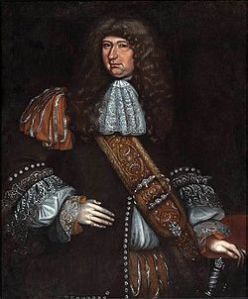I would like to present my 9th great uncle, brother-in-law to Mehitabel Braybrooke Downing

Sir George Downing is high on my list of “ancestors of whom I am not proud to claim.” Downing was a man of considerable political, diplomatic, and financial ability, but his character has often been brought into question by his enemies because of his willingness to make the most of changing political circumstances and to viciously betray former comrades to win favor from those in power.
Downing Street, the residence of the British Prime Ministers, was named after him and Downing College in London was named after his grandson, Sir George Downing III. Sir George Downing, 1st Baronet, led an intriguing life and was in the first graduating class at Harvard.
George Downing was born in 1623 in Dublin, Ireland to Emanuel Downing and his wife, Lucy Winthrop. Emanuel was a lawyer or barrister of the Inner Temple in London. The Downings were highly esteemed Puritans and apparently careful in planning George’s educational path. They did not approve of the “raucous behavior” displayed by many of the students at Cambridge and migrated to the colonies. Some historians implied the Downings encouraged Lucy’s brother John Winthrop, the governor of Massachusetts to establish a college as a condition for their move to the new colony.
Emanuel Downing moved his family to Salem, Massachusetts in 1638 and they lived with Governor John Winthrop until their residence was built. George attended Harvard College and was one of nine students in the first graduating class of 1642. Harvard hired him as the college’s first tutor. George began his professional career as a preacher and instructor of the seaman in 1645 when he sailed for the West Indies with slaves in tow.
He arrived in England some time afterward as chaplain to Colonel John Okey’s regiment. George’s abandoned his career as a preacher for politics and a military career. In 1650, he was scoutmaster of Cromwell’s forces in Scotland and joined the rebellion against King Charles I and in 1657, and appointed as a Teller of the Exchequer. George’s marriage in 1654 to Frances Howard aided his advancement, and he served in Cromwell’s parliament. Downing was one of those who tried to persuade Cromwell to declare himself king, but without success.
Downing was in Holland as an ambassador when Cromwell died, and Cromwell’s son Richard failed to carry on the Republican dynasty. Sentiment in England had changed, leading to the enthusiastic welcome of King Charles II. This presented a danger to George who had been a loyal supporter of Cromwell.
George Downing showed himself to be an able diplomat and switched allegiances back to Charles II in 1660. He declared his abandonment of “principles sucked in” during his time in the American colonies and now “saw the error.” He had some secret documents in his possession that he handed over to the king as proof of his good intentions. Downing was knighted in May 1660, given his old Treasury job back, and also granted a tract of land near St James’s Park that includes the present site of Downing Street.

During the restoration of the crown, George organized spy rings which hunted down many of his former comrades who were royalist enemies, including John Okey, his former commander, and sponsor. Downing condemned them to death by deporting them back to England. Samuel Pepys characterized his conduct as odious through useful to the king and called him a “perfidious rogue” and that “all the world took notice of him for a most ungrateful villain for his pains.” Charles II created a baronet for George in 1663.
In 1671, George was sent to Holland to break up the policy of the Triple Alliance (England, Sweden, and the United Provinces). He was extremely unpopular in Holland, and after three months Downing fled to England, in fear of his life. For this unauthorized move, Downing was sent to the Tower of London in 1672 but was released within a few weeks.
More than any other man he was responsible for arranging the acquisition of New York from the Dutch. Downing Street in Manhattan and Brooklyn, New York were named in his honor.
George Downing’s Puritan mentors and teachers in the Massachusetts Bay Colony were furious when he blamed their ideas and teachings for his time with Cromwell. It became a proverbial expression in New England to refer to a false man who betrayed his trust as “an errant George Downing.”
George Downing died in Cambridge, England on July 22, 1684, and had acquired a substantial fortune. He was the largest landowner in Cambridgeshire. His eldest son succeeded him in his title as Sir George Downing, 2nd Baronet.
Sir George Downing is the brother of John Downing, Mehitabel Braybrooke’s husband. George returned to England with his parents, but most of his younger siblings remained in the Massachusetts’ Colony.
You can read more about the Downing family in “In the Shadow of Salem”, a historical novel scheduled to be released June 2018 by Heritage Beacon, an imprint of Lighthouse Publishing of the Carolinas.